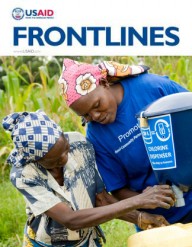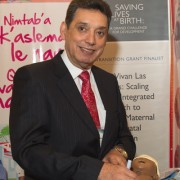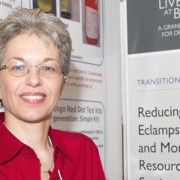The four are champions of expectant mothers who live in some of the poorest places on the planet. Their names aren’t universally known. However, what they lack in star power, they make up in something with even more appeal—a solid idea and, now, a couple million dollars to bring it to life on a larger scale.
USAID’s Saving Lives at Birth Grand Challenge this year selected four projects that address the 48 critical hours after birth—when mother and child are most at risk for deadly medical complications—to receive up to $2 million each for what is known as “transition-to-scale” funding, which essentially means they’ll put to the test the ideas they’ve been nurturing for years.
A Series of Grand Challenges
Savings Lives at Birth is one of five initiatives in the Grand Challenges series where USAID is working with partners—including government agencies and private foundations—to encourage innovators to tackle global problems that remain challenging to address. The other four:
Securing Water for Food
All Children Reading
Powering Agriculture
Making All Voices Count
“It’s exciting and enormously gratifying to see the original vision for Saving Lives at Birth begin to materialize over these three rounds of funding,” said Wendy Taylor, director of USAID’s Center for Accelerating Innovation and Impact. “The global call for groundbreaking new solutions for maternal and neonatal health has been met with an overwhelming response with over 1,500 applications from across the globe—with nearly half of the applications now coming from the developing world. We’ve seen first-hand that good ideas can truly come from anyone, anywhere.”
Saving Lives currently supports 59 innovations from for-profits and nonprofits, academics, students, engineers—even auto mechanics.
“The global health landscape is littered with great ideas that have failed to reach scale,” Taylor said. “This program is not just about seeding new innovation but investing in those most promising ideas that have the potential to scale up and sustain impact over time.”
Saving Lives is a collaboration between USAID and four partners—the Government of Norway, the Bill & Melinda Gates Foundation, Grand Challenges Canada and the United Kingdom’s Department for International Development—to reach beyond the usual suspects to come up with solutions that help prevent infant and maternal deaths.
Though that window just after birth should be a time of joy for families, for some it marks a race against time to prevent complications from taking the life of mother and infant. As many as 150,000 mothers worldwide die during or after childbirth; 1.6 million infants die shortly after birth; and 1.2 million stillbirths happen every year. The numbers have proved stubborn to move, especially in the developing world.
This year’s grand challenge announced a total of 22 winners, with 18 receiving seed funding up to $250,000 to build and test their ideas on a small scale and four transition-to-scale proposals deemed ready for implementation.
“One of the pleasant surprises this year,” said Taylor, “was continuing to receive such a diverse mix of cutting-edge proposals. After several rounds of competition, we’re not running out of good ideas. Innovators are still rising to the challenge and putting forth novel, creative solutions to these seemingly intractable problems.”
Related Links
Ask Wendy Taylor … What exactly is the Xcelerator?
USAID developed the Xcelerator to provide innovators mentorship and commercialization support, helping them develop and strengthen skills to define robust business models, carve out viable pathways to scale that are relevant for the ecosystems in which they work, and form the right partnerships. USAID’s Global Health Xcelerator is built around two partnerships.
- The Lemelson Foundation and the National Collegiate Innovators and Inventors Alliance offer decades of experience providing innovators the skills, systems and networks to scale and achieve sustainability.
- The Duke University SEAD program is one of USAID’s Higher Education Solutions Network labs. SEAD stands for Social Entrepreneurship Accelerator at Duke and is a multidisciplinary program aimed at identifying, scaling and studying innovations.
Many of the Saving Lives at Birth grantees will receive scale-up support from one of these two programs to put them on the best path for success.
Wendy Taylor is the director of USAID’s Center for Accelerating Innovation and Impact











Comment
Make a general inquiry or suggest an improvement.